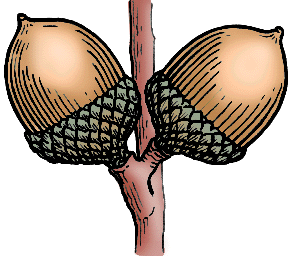Illustration of acorn

 Meg Wingerter, Denver Post, 4 July 2025
Moths chew holes in cabbage; squirrels plant acorns in the garlic plot.
—
Meg Wingerter, Denver Post, 4 July 2025
Moths chew holes in cabbage; squirrels plant acorns in the garlic plot.
— Ryan Murphy, IndyStar, 2 July 2025
When the layer was unearthed, researchers found more than 450 lead missile acorns, a type of small projectile, and nine iron dart tips, according to the release.
—
Ryan Murphy, IndyStar, 2 July 2025
When the layer was unearthed, researchers found more than 450 lead missile acorns, a type of small projectile, and nine iron dart tips, according to the release.
— Irene Wright, Miami Herald, 23 June 2025
Like planting an acorn, the benefits of R&D take time to grow.
—
Irene Wright, Miami Herald, 23 June 2025
Like planting an acorn, the benefits of R&D take time to grow.
— John Drake, Forbes.com, 19 May 2025
See All Example Sentences for acorn
John Drake, Forbes.com, 19 May 2025
See All Example Sentences for acorn
Middle English akorn, akkorn (partially assimilated to corn "kernel, corn entry 1"), hakerne, accherne, accharne, going back to Old English æcern, going back to Germanic *akrana- (whence also Middle High German ackeran "tree nuts," Old Norse akarn, Gothic akran "fruit, produce"); akin to Old Irish írne "sloe, kernel," Welsh eirin "plums, sloes," aeron "fruits, berries," going back to Celtic *agrinyo-, *agranyo-; perhaps further akin to a Balto-Slavic word with an initial long vowel (Old Church Slavic agoda "fruit," Polish jagoda "berry," Lithuanian úoga)
Note: Taken to be a derivative of Indo-European *h2eǵros "uncultivated field, pasture" (see acre), though this would seem to exclude the Balto-Slavic etymon, which lacks the suffix, from consideration. It is also not clear if fields, uncultivated or not, are the source of wild tree nuts.
before the 12th century, in the meaning defined above
“Acorn.” Merriam-Webster.com Dictionary, Merriam-Webster, https://www.merriam-webster.com/dictionary/acorn. Accessed 20 Jul. 2025.
Nglish: Translation of acorn for Spanish Speakers
Britannica.com: Encyclopedia article about acorn
Share